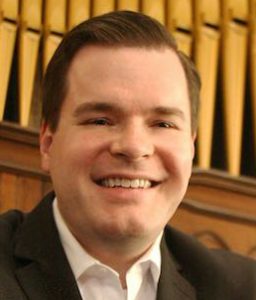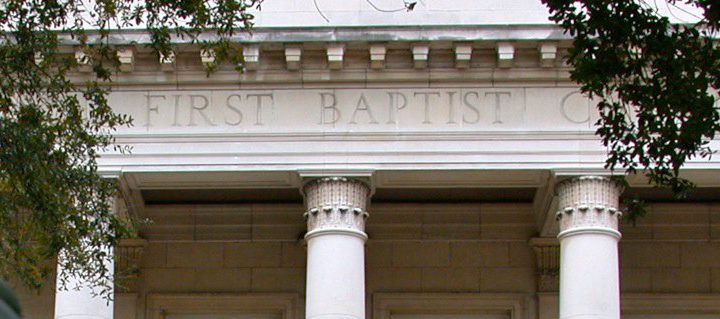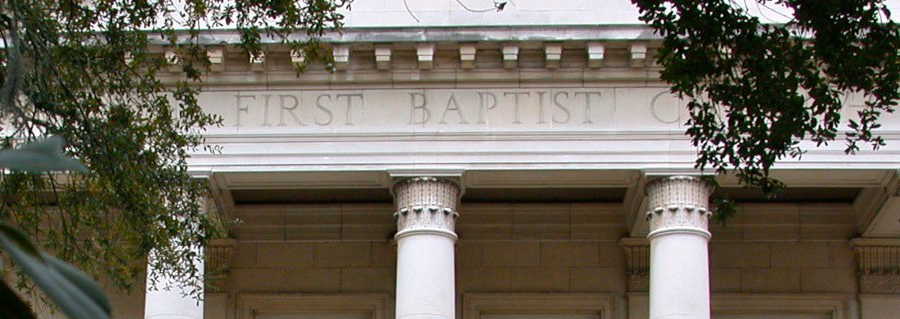I have the honor of serving a progressive congregation in one of the most beautiful cities of the Southeast. Our church is steeped in history with strong liturgical worship, and we pride ourselves on being welcoming and affirming, while also being active in both local and global missions.
We have loving people and quality programing, but we struggle to get people through our doors. Why? Because the word “Baptist” is emblazoned on the facade of our 200-year-old edifice, and people have preconceived notions about who we are and what we believe.

Justin Addington
The word scares those who agree with our principles, and our principles frighten those who are attracted by the denominational title. Does any of this sound familiar?
I have a friend who is a dyed-in-the-wool Southern Baptist. We tend not to talk too much about religion since we are on such different planes theologically. But when we do talk about our churches, she often makes judgmental comments about what my church stands for and often says, “Your church is not a real Baptist church.”
Having grown up United Methodist and being a relative newcomer to Baptist life, I never really know how to respond to her. I was fortunate enough to be introduced to my congregation over a decade before joining the staff, but I still find myself having a desire to understand the core values of the Baptist faith outside my context.
Our church recently formed a committee to investigate how to bring others into our fellowship while remaining true to our Baptist identity. As part of that process, we examined several avenues for outreach, including updating our website. We wanted to include some information about historic Baptist beliefs and, to be honest, I felt it would be educational for me as much as anyone else.
I scoured the internet for material and settled on adapting what I found on the Cooperative Baptist Fellowship’s website, since that is the larger denominational body with which our church most closely associates. In my reading, I was both comforted and alarmed. I was comforted by how much of what I read resonated with me, but I was alarmed by how much of what I read was contrary to what I know most people believe to be true about Baptists.
The following information is now listed on the “About” page of our church website:
Priesthood of believers — We believe in the priesthood of all believers and affirm the freedom and responsibility of every person to relate directly to God without the imposition of creed or the control of clergy or government.
Scriptural authority — We believe in the authority of Scripture. We believe the Bible, under the lordship of Christ, is central to the life of the individual and the church. We affirm the freedom and right of every Christian to interpret and apply Scripture under the leadership of the Holy Spirit.
Congregational autonomy — We believe in the autonomy of every local church. We believe Baptist churches are free, under the lordship of Christ, to determine their membership and leadership, to order their worship and work, to ordain whomever they perceive as gifted for ministry, and to participate as they deem appropriate in the larger body of Christ.
Separation of church and state — We believe in the freedom of religion, freedom for religion and freedom from religion. We support the separation of church and state.
Lordship of Christ — We confess Jesus to be God’s Son, the Messiah. He gave his life for our sake and comes again and again by the Holy Spirit, to communicate himself to his people, the church.
The lordship of Christ is something all forms of Baptists hold dear, even though doctrines on salvation and baptism differ from church to church. Beyond that, the core beliefs of the Baptist faith have been twisted in modern times, causing considerable damage to the name (not to mention the recent scandals in the Southern Baptist church).
“People are being told what to think and what to do, and the Holy Spirit seems to have very little to do with it.”
This is especially true for the Baptist view on scriptural authority. While most Baptists would view the Bible as the ultimate guidebook for faith and practice, dogmatic clergy are no longer leaving the free (or even educated) interpretation of Scripture up to the individual. As with so many things in our society, people are being told what to think and what to do, and the Holy Spirit seems to have very little to do with it.
Congregational autonomy is another tenet most Baptists would say they adhere to without question. But in recent days, we have seen larger denominational bodies exerting almost abusive control over Baptist congregations — claiming if you don’t do and say exactly what they want, they will kick you out.
The church has become a microcosm of our divided nation, and with the rise of Christian nationalism, the freedom of the believer is in jeopardy now more than ever.
The majority of Baptists also would agree the priesthood of believers is an ideal they value. However, the “freedom of every person to relate to God without the control of clergy or government” is being lost at a rapid pace. We see stories in the news of Baptist clergy controlling their congregants in very unhealthy ways, and we seem to be in a never-ending battle for truth in our nation.
“This would be the most un-Baptist thing imaginable.”
The most troubling deviation from historic Baptist beliefs has to do with the separation of church and state. Early Baptists came to America to escape a state religion, and they firmly felt neither had the right to interfere in the affairs of the other. Today, however, politics are being preached with a vengeance from the pulpits of most Southern Baptist churches, and it is safe to say the ultra-conservatives of our nation would like to see Christianity adopted as a state religion. This would be the most un-Baptist thing imaginable.
I am not claiming there is one “right” way to be Baptist. However, I am saying many Baptist churches have strayed from historic Baptist principles. It is high time the term “Baptist” is reclaimed by those who hold close to Baptist ideals.
Instead of apologetically saying, “We are not that kind of Baptist,” we should proudly proclaim, “We are real Baptists!”
So, let us joyfully live into the things that set us apart and work with humility to provide places of safety and respite for those who have been harmed by churches of all names. What we adhere to may be different, but our gospel calling is the same.
Justin L. Addington serves as minister of music and acting head of staff at First Baptist Church of Savannah, Ga. He holds a bachelor of arts degree in music education, a master of church music degree in choral conducting and a doctor of theology degree in worship studies. To learn more about Justin and his work, visit www.justinladdington.com.


